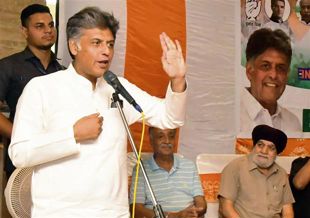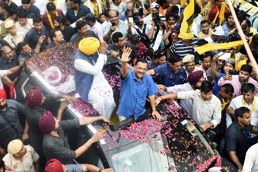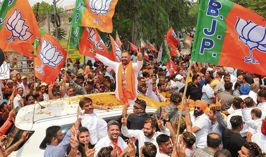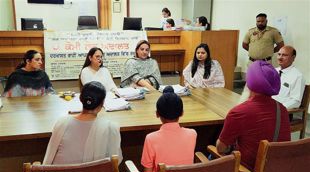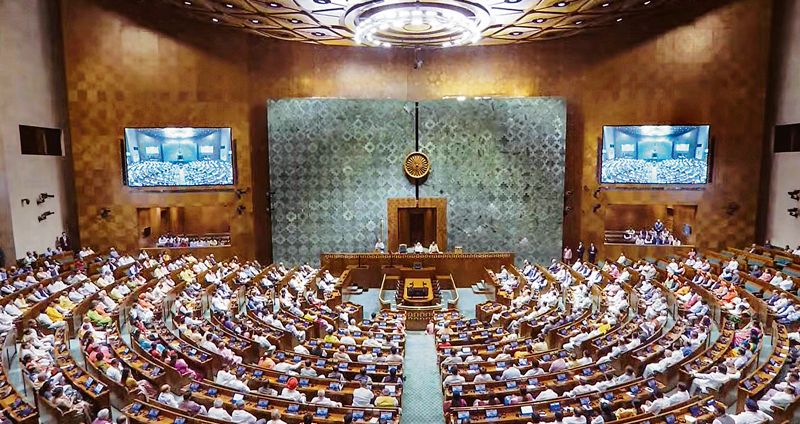
RESPONSIBILITY: The real challenge for us is to make our representatives accountable. PTI
Sociologist
IT is always easy to get carried away by a spectacle. Not surprisingly, the nation — even though tormented by heightened socio-economic inequality — loved to watch the gorgeous inauguration of the new Parliament House: the drama with its carefully packaged religious symbolism. And it would not be wrong to say that there were many who were simply hypnotised by the way PM Modi’s dramaturgical performance added yet another dimension to the spectacle; yes, it almost looked like his ‘coronation’! However, those who have the eyes to see beyond the visual politics of images ought to acquire the courage to raise critical questions, act like organic intellectuals, converse with the people and communicate a simple yet profound truth — the personality cult associated with PM Modi does by no means enrich the spirit of democracy; it is dangerous to project a democratically elected Prime Minister as the ‘messiah’ of the nation. Or, for that matter, the Parliament building is not just a piece of architectural marvel; nor is it about the pride of the ‘supreme leader’ — his Mann ki Baat, the never-ending applause from his devotees, and associated noise of populist politics.
The increasing use of the coercive apparatus of the state to silence dissenting voices is becoming the new normal.
Parliament is essentially about debate and dialogue, humility and the art of listening, informed opinion and responsibility of decision-making, and ethical responsibility and commitment to the people. Hence, the fact that we have a new Parliament House does by no means ensure that we are enriching the democratic culture.
Yes, there are political theorists and social scientists who have been repeatedly reminding us of the rise of populist politics, the cult of narcissism, the might of majoritarianism, the rise of hyper-nationalism and the steady erosion of the democratic culture in many countries throughout the world. Moreover, the increasing use of the coercive apparatus of the state to silence dissenting voices or the steady decline of press freedom is becoming the new normal. Is it that we too are moving in the same direction? It is important to ask this disturbing question, even though India is known for the carnival of elections characterised by populist speeches, roadshows, huge rallies and manifestos with big promises. But then, think of the pathology: narrow parochial identities in the name of caste and religion are activated and used instrumentally by the political class; politicians with a criminal background are elected comfortably; riots, cross-border tensions and surgical strikes are valorised as ‘masterstrokes’ for winning the elections in the name of nationalism. Institutions such as the Election Commission and the CBI are fast losing their autonomy through politically manipulated appointments. Defection is a preferable strategy to destabilise governments as there are MLAs and MPs with no conscience who are ready to be bought and sold as marketable commodities. Amid the normalisation of this pathology, is it possible to deny that we are fast moving towards some sort of electoral autocracy?
Well, you and I can appreciate the grandness of the new Parliament House. However, the real challenge is whether we can see beyond the facade of a building, work on ourselves, internalise democracy as a way of life through meaningful education and socialisation in an inclusive public sphere, and make our representatives accountable. Yes, the representatives we send to Parliament can truly behave democratically, participate in socially relevant and informed discussions on our collective destiny, and serve people only if we, far from being reduced to passive spectators or empty vessels, cultivate the spirit of democratic education. After all, we get the leaders we deserve. For instance, if we allow ourselves to be impressed by loud religious slogans and the rhetoric of nationalism, or if we think that the shining anchors of toxic television channels are our primary educators, we will continue to see a bunch of zealots in the new Parliament House. Or, if we see ourselves as passive devotees waiting to be salvaged by a ‘messiah’, we will worship authoritarian/narcissistic personalities. Hence, political democracy is impossible without democratic education.
To put it simply, democratic education is about the constant cultivation of a set of skills — say, the ability to interrogate the ideologies of domination and repression; the intellectual clarity to distinguish the light of truth from the false glitz of power; the art of informed debate, dialogue and conflict resolution; the willingness to transcend the superficially constructed dualities such as rights vs duties, or freedom vs responsibility; and the ceaseless effort to live as an alert and awakened citizen. Needless to add, if the gospel of neo-liberalism continues to transform us into atomised and selfish consumers, or if the madness of religious fundamentalism/hyper-nationalism clouds our vision and thinking, it will be almost impossible to cultivate the spirit of democratic education.
Not surprisingly, in recent times, we have witnessed the growing assault on the idea of liberal and politically vibrant universities. We have seen a steady erosion of critical pedagogy amid the marketisation of all sorts of education shops and strategists whose only task, it seems, is to tempt young students with all sorts of ‘placement and salary package’ mythologies. The resultant intellectual void is conducive to the growth of authoritarianism. You and I might acquire technical skills, pass all sorts of examinations, and decorate our CVs with degrees and diplomas. Yet, we can continue to worship demagogues with narcissistic traits, regard those who are fighting for the rights of Adivasis, Dalits and minorities as ‘anti-national’, and equate development with just a set of external markers — say, a tall statue, a spectacular temple, a speedy train, a smart city, an international summit in the Kashmir valley or, for that matter, a new Parliament House. What else do authoritarian leaders need from us?
Join Whatsapp Channel of The Tribune for latest updates.
























